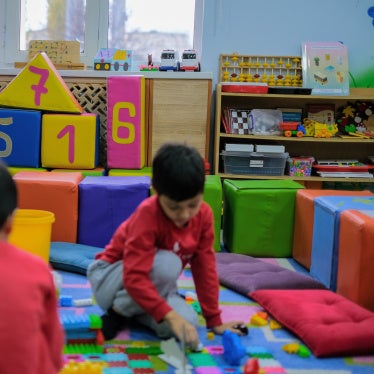Human Rights Watch believes that the outcome from the Special Session must meet four basic criteria:
1) It must reinforce the nearly universally ratified Convention on the Rights of the Child, and hasten the full implementation of the Convention.
2) It must support universal ratification and implementation of key new treaties developed during the past decade that strengthen the protection of children.
3) Its goals should reflect the importance of the critical rights of children to protection from violence, exploitation and abuse, as well as those in the social sector areas which have traditionally received greater attention (health, education, etc.).
4) It must ensure strong mechanisms to monitor government obligations and commitments that include meaningful participation by non-governmental organizations and civil society.
Human Rights Watch supports the draft outcome document's focus on the rights of children and the fundamental importance of the Convention on the Rights of the Child as a basis for ensuring the survival, protection, development and participation of children. We particularly welcome Section II., "Our Challenge," and Section V.2, "Protecting against Abuse and Exploitation," which acknowledge the broad range of hazards and abuses faced by children, and recognize the particular vulnerability of children affected by armed conflict, children with disabilities, street children, children engaged in abusive labor, and those subject to violence and other forms of exploitation.
While we welcome the document as a useful basis for discussion, we believe certain elements can be strengthened and improved.
Reinforcing the CRC: When the 1990 World Summit for Children took place, the Convention on the Rights of the Child had just been adopted, and the process of its signature and ratification was still in its earliest stages. The Declaration adopted at the Summit identified the Convention as "a new opportunity to make respect for children's rights and welfare truly universal." Ten years later, the Convention has been ratified by 191 nations, signifying nearly universal recognition and acceptance of a comprehensive child rights agenda. However, failure to fully implement the Convention stands today as the single largest impediment to the global realization of children's rights. To improve the lives of children, hastening the full implementation of the Convention must be at the heart of commitments made at the Special Session.
Support for New Standards: New instruments have been created and adopted in the last decade that strengthen the protections guaranteed by the Convention in significant ways. These particularly relate to the situation of children in armed conflict and those involved in abusive child labor. Taken together with the Convention, these instruments create a powerful legal framework on behalf of children.
We recommend:
· The Special Session should recognize the importance of new treaties adopted in the last decade and commit to ratification of the following instruments by 150 states by 2005, and work towards universal ratification by 2010: Optional Protocol to the Convention on the Rights of the Child on the involvement of children in armed conflict, the Rome Statute for the International Criminal Court, the Mine Ban Treaty, and ILO Convention 182 on the Worst Forms of Child Labor.
Reflecting the Full Range of Children's Rights: The World Summit on Children adopted laudable goals to improve the health and welfare of children. However, the major goals identified in the Plan of Action adopted at the Summit dealt almost exclusively with health, nutrition and education. As the full range of children's rights - including civil rights and freedoms, and the right to protection from abuse, economic and sexual exploitation, torture and other forms of violence, etc., have become broadly recognized, it is incumbent upon governments to adopt appropriate goals encompassing the survival, protection, development and participation of children. The "key objectives" identified in Section IV of the draft outcome document do not reflect such a comprehensive approach. Of the twenty-one goals identified, nine relate to health and four relate to education. While the eight remaining goals encompass a range of issues, many are very general, and important elements are not adequately addressed. In particular, Human Rights Watch recommends the inclusion of the following goals:
· Violence: By 2005, a comprehensive international study on violence against children should be completed by the Secretary General. As recommended by the Committee on the Rights of the Child, such a study should explore the different types of violent treatment of which children are victims, the extent of such violence and its impact on children, and put forward recommendations for action, including effective remedies and preventative and rehabilitative measures.
· By 2010, the recommendations of the study should be implemented with a view towards eliminating violence against children. All states should include in their states parties reports to the Committee on the Rights of the Child information on all alleged cases of abuse or death of children in state custody, including steps taken to investigate such cases and prosecute the perpetrators.
Juvenile Justice: By 2005, all states should significantly reduce the number of children in detention, eliminate any application of the death penalty for offenses committed before the age of eighteen, and ensure that national juvenile justice mechanisms are in accordance with the Convention on the Rights of the Child and other relevant international standards, including the UN Standard Minimum Rules for the Administration of Juvenile Justice, the UN Rules for the Protection of Juveniles Deprived of their Liberty, and the UN Guidelines for the Prevention of Juvenile Delinquency. Independent monitoring mechanisms should be established in each state to investigate conditions of detention and ensure that the rights of children are respected.
· Children and Armed Conflict: Eliminate the use of children as soldiers by 2010 and fully implement programs and policies to effectively protect the rights of refugee and internally displaced children, including their rights to education, health and safety.
Monitoring Mechanisms: The successful implementation of goals established at the upcoming Special Session on Children will depend on a vibrant and meaningful monitoring system. Unfortunately, the monitoring section of the document is weak and vague, and does not specify mechanisms that will ensure implementation of the outcome document's goals. We recommend:
· Each national government should establish or designate an independent body to monitor the progress made in implementing the Convention on the Rights of the Child and the goals of the outcome document of the Special Session, and to ensure that each country adopt a comprehensive national plan of action, with specific, time-bound and measurable objectives. Such a body must include active participation by non-governmental organizations.
· Governments should include systematic information on their progress in implementing the goals of the outcome document and their national plans in their regular reports to the Committee on the Rights of the Child.
· Governments should commit additional resources, in particular for staff support, to the Committee on the Rights of the Child to ensure its effective functioning.







